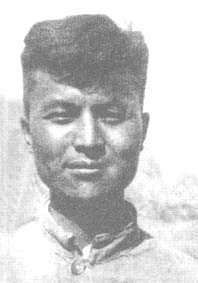Li Rui (politician)
Li Rui (simplified Chinese: 李锐; traditional Chinese: 李銳; pinyin: Lǐ Ruì; April 13, 1917 – February 16, 2019)[1] was a Chinese historian and politician. He joined the Communist Party in 1937 and became the personal secretary to Mao Zedong on industrial affairs.[2]:364 After retiring from political life, Li became a writer and a vocal advocate of democratic reform in China.[3]
Li Rui | |
|---|---|
李锐 | |
 | |
| Personal details | |
| Born | April 13, 1917 Beijing |
| Died | February 16, 2019 (aged 101) Beijing |
| Political party | Communist Party of China |
Early life
Li Rui was born in Beijing in 1917.[4] In 1934, he enrolled for Wuhan University, studying engineering.[4]
Political career
Li was an early and enthusiastic member of the Communist Party, having trekked to the Communist base at Yan'an in the late 1930s. Within a few years, he first suffered revolutionary persecution there.[5]
In 1945 he was made the secretary to Gao Gang, a post which he held until 1945.[4] In the mid-1950s, Li was briefly one of Mao Zedong's secretaries, giving him access to the inner circle of China’s ruling elite, but his criticisms of the Great Leap Forward and support for Peng Dehuai led to his denunciation and exile. He later declared that Mao was dismissive of the suffering and death caused by his policies: "Mao's way of thinking and governing was terrifying. He put no value on human life. The deaths of others meant nothing to him".[5][6]
Li was then denounced as an anti-party element and spent twenty years in prison, emerging in 1979 and three years later being elected to the Central Committee, then in 1983 going on to be vice director of the Organisation Department of the Communist Party.[7]
Li was a vice minister of the Ministry of Water Conservation and later at the time of its planning was opposed to the Yangtze Three Gorges Project.[8] He continued to oppose construction of the dam after the 1989 Tiananmen Square protests.[9]
Dissent
At the 16th Communist Party Congress in 2002, Li wrote an open letter to Party Secretary Hu Jintao on political reform of the Communist Party. In the letter, Li argued that constitutionalism would lead the Communist Party away from political mishaps such as the Anti-Rightist Movement, the Great Leap Forward and the Cultural Revolution.[10] In November 2004, the party's Propaganda Department banned Li from being published in the media.[3]
On hearing of the death of Zhao Ziyang in 2005, Li returned to Beijing from overseas and immediately went to the former general secretary’s home to pay his last respects.[8]
In 2006, he was a lead signatory to an open letter condemning the state's closure of the investigative newspaper Freezing Point.[11]
Ahead of the 17th Communist Party Congress in 2007, Li and retired academic Xie Tao published articles calling for the Communist Party to become a European-style socialist party, remarks that were condemned by the party propaganda apparatus.[12]
In October 2010, Li was the lead signatory to an open letter to the Standing Committee of the National People's Congress, calling for greater press freedom.[13][14]
Personal life
Li had a daughter, Li Nanyang. They became estranged after she rejected him as an enemy of the party during his fall from power in the 1950s. Through her efforts in the late 1970s, he was returned from exile and restored to his former rank and the two were reconciled.[5][8][15] Li died of organ failure in Beijing on February 16, 2019, aged 101.[16]
Publications
Among many others, his publications include:
- 《李锐谈毛泽东》 [Li Rui on Mao Zedong]. 2005. ISBN 988-98282-2-7.
- 《庐山会议实录》 [Mount Lu Meeting Records]. 春秋出版社. ISBN 7-5069-0199-4.
See also
References
- 毛泽东前秘书李锐过世 享年101岁. Zaobao (in Chinese). February 16, 2019. Retrieved February 16, 2019.
- Sullivan, Lawrence R. (2016). Historical Dictionary of the People's Republic of China. London: Rowman & Littlefield. ISBN 9781442264687.
- Volland, Nicolai (May 16, 2014). "Fifty Influential Public Intellectuals". Heidelberg University. Retrieved February 16, 2019.
- Song, Yuwu (2013). Biographical Dictionary of the People's Republic of China. Jefferson, NC: McFarland. p. 180. ISBN 9781476602981.
- "Interviews in 'Morning Sun': Intergenerational and family stories". Morning Sun (film). Long Bow Group. 2003. Retrieved February 16, 2019.
- Jonathan Watts. China must confront dark past, says Mao confidant The Guardian, June 2, 2005
- Sullivan, Lawrence (2011). Historical Dictionary of the Chinese Communist Party. Scarecrow Press. p. 159.
- Li Rui, Former Secretary of Chairman Mao, and Maj. Gen. Chang Zhonglian Reflect on Zhao Ziyang, Epoch Times, January 28, 2005, trans from Chinese
- Johnson, Ian (February 15, 2019). "Li Rui, a Mao Confidant Who Turned Party Critic, Dies at 101". The New York Times. ISSN 0362-4331. Retrieved February 16, 2019.
- Zheng, Yongnian (2009). The Chinese Communist Party as Organizational Emperor: Culture, Reproduction, and Transformation. Abingdon. ISBN 9781135190910.
- "Party elders attack China censors". BBC News. February 14, 2006. Retrieved February 16, 2019.
- Hu Jintao Battles the CCP's Crisis of Confidence Archived October 11, 2007, at the Wayback Machine, Willy Lam (Jamestown Foundation's China Brief)
- Chinese Cadres Say ‘Black Hands’ Choke Wen’s Political Reforms, Business Week, October 13, 2010
- "Open letter from ex party officials calls for end to media censorship in China". South China Morning Post. October 13, 2010. Retrieved February 16, 2019 – via Phayul.com.
- Staff (April 13, 2017). "Li Rui: China's red rebel turns 100". BBC News. Retrieved April 23, 2017.
- Ian Johnson (February 15, 2019). "Li Rui, a Mao Confident Who Turned Party Critic, Dies at 101". The New York Times. Retrieved February 15, 2019.